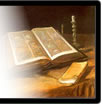Bibliography
Geisler, Norman L. and William
E. Nix. A General Introduction to the Bible. Chicago: Moody Press. 1968 ,
revised in 1986.
In-depth, difficult reading, but
well worth the effort. Addresses questions: Who wrote the Bible? Which books
were included and why? Has it been accurately preserved? Do we have accurate
translations?
Ham, Ken;
Jonathan Sarfati and Carl Wieland. The Answers Book. Green Forest, AR: Master Books. 1990, revised 2000.
Subtitled The 20 most-asked
questions about creation, evolution, and the book of Genesis, answered,"
this book offers scientific arguments for a literal six-day creation and
addresses questions about carbon dating, the age of stars, where Cain got his
wife, the flood, continental drift, how all the animals fit on the ark, the ice
age, and what happened to the dinosaurs." Excellent
resource--scientific, but simplified for the non-scientist.
McDowell, Josh. The New Evidence that Demands a Verdict. Nashville: Thomas Nelson Publishers. Original copyright 1972 under two titles; completely revised 1999.
Indispensible reference book for
defending your faith. Difficult reading, addresses issues in-depth; an absolutely
necessary reference book.
McDowell,
Josh, and Bob Hostetler.
Don't Check Your Brains at the Door.
Extremely readable book intended
for teens, but good material for adults, too. Addresses each
issue in three pages or less each. Interesting,
entertaining, and good for defending major points of the faith. Example:
How can we know Jesus rose from the dead? How can we know our Bible isn’t full
of mistakes? Also has short activities at the end of
each chapter for use with bible studies or groups.
McDowell,
Josh, and Bob Hostetler.
Right from Wrong: What You Need to Know to Help Youth Make Right Choices. Dallas: Word Publishing. 1994.
Absolute truth
vs. moral relativism.
Why does truth matter? What is truth? Book explores logic and morality, and
right and wrong in relationships, families, lifestyles. Very
readable.
McDowell, Josh
and Don Stewart. Answers.
(Subtitle: Answers to Tough Questions Christians Ask about the Christian
Faith.) Wheaton, Illinois: Tyndale House
Publishers. 1980.
Simple,
single-page answers to some 50 difficult questions about the Bible. Where did Cain get his wife? What is the Apocrypha, and why aren’t those books in Protestant
Bibles? What is the Trinity, and why isn’t that the same as three gods? How can
we know Jesus existed? That he was raised from the dead? What happens to people
who never hear the gospel? How did all the animals fit on the ark? What about
Bible contradictions? All these and many more are answered simply, with
additional references given for more in-depth reading. This book is an easy
read, and highly recommended.
Montgomery, John Warwick.
History and Christianity: Evidence for a Historical Jesus. Minneapolis, Minnesota: Bethany House Publishers. 1964.
Short, simple,
academic, to-the-point arguments for the historical figure of Jesus and the
authority of scripture, especially New Testament.
Morris, Henry
M. Science and the Bible.
Chicago: Moody Press. Original
copyright 1951. Revised and expanded, 1986.
Quite readable by a
non-scientist, this book reviews the basic laws of science and the fields of
science necessary to understand creation/evolution. It outlines both theories
and discusses science and the flood, including looks at the geologic column and
fossil graveyards. Also addresses the age of the earth and has a chapter on
fulfilled Old Testament prophecy.
Whitcomb, John
C. and Henry M. Morris.
The Genesis Flood: The Biblical Record and its Scientific Implications. Phillipsburg, NJ: P&R Publishing. 1961.
A scientific look at the
probably causes and effects of a worldwide flood, including geology, effects on
plants and animals, etc. In-depth, difficult reading.
Whitcomb, John C. The World that Perished. Grand Rapids, Michigan: Baker Book House. 1998.
Sequel to The Genesis Flood,
this book defends a supernatural, worldwide. catastrophic
flood and uses scientific observations to support its defense. Shorter and less difficult than The Genesis Flood. Stands alone, despite being a sequel.





